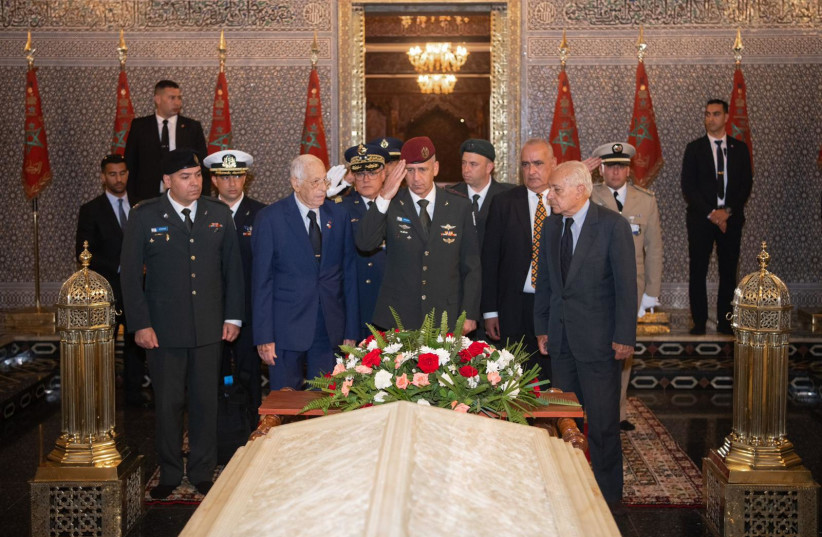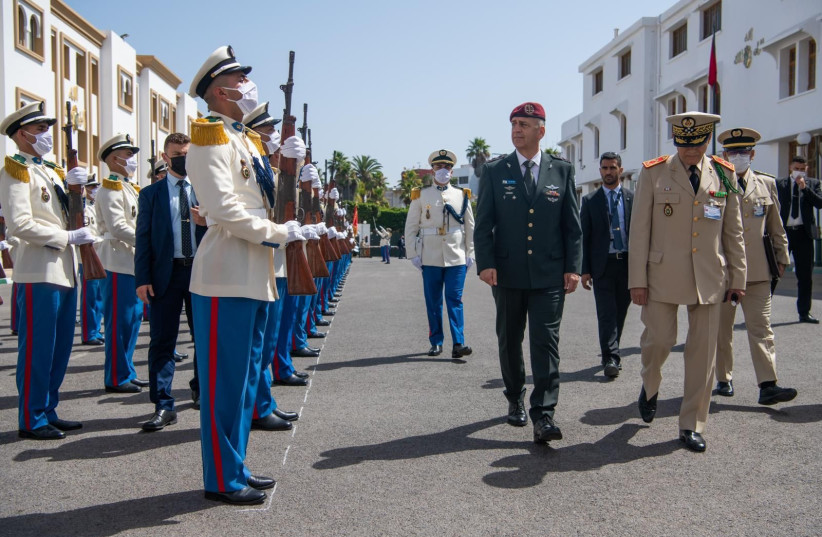IDF Chief of Staff Lt.-Gen. Aviv Kohavi began his official visit to Morocco on Tuesday, the first-ever visit by an Israeli military official of his rank to the North African kingdom.
Kohavi began his trip in Rabat by visiting the mausoleum of King Muhammad V, where he laid a wreath on behalf of the IDF and Israel and signed the guest book at the site.
He then met with Defense Minister Abdellatif Loudiyi and then received an honor guard. Following that he met with the Chief of the Royal Armed Forces Lt.-Gen. Belkhir El Farouk and with the chief of Morocco’s Intelligence Directorate, Brahim Hassani. The officers then held a strategic panel in the presence of division heads of the Moroccan military.
Kohavi is joined by the head of the IDF’s International Cooperation Division, Brig.-Gen. Efi Defrin, and the head of Military Intelligence’s Research Division, Brig.-Gen. Amit Saar.
What do the meetings mean?

“The meetings discussed opportunities for military cooperation, both in exercises and training, as well as in the operational and intelligence fields,” the IDF said in a statement, adding that “the officials noted the historical and cultural ties between the two nations and their common interests in the Middle East.”
“The meetings discussed opportunities for military cooperation, both in exercises and training, as well as in the operational and intelligence fields.”
IDF Spokespersons Unit
The chief of staff will visit Marrakech on Wednesday where he will visit an Air Force Base before he visits the city’s synagogue where he will meet with members of the Jewish community, including veterans of Israeli wars.

Deputy Chief of the General Staff Maj.-Gen. Herzi Halevi will replace Kohavi until he returns.
The history of the relationship between Israel and Morocco
While Jerusalem and Rabat have maintained covert military ties for years, they only reestablished official ties under the Abraham Accords along with the United Arab Emirates, Bahrain and Sudan.
Though Morocco is one of several countries to have normalized ties with Israel, the ties between the militaries are warmer and stronger than those of the Gulf, due in part to the historically strong Jewish community.
Morocco also faces different threats than the Gulf States, allowing the military ties between the two countries to be more open and public.
In November, the two countries signed a memorandum of understanding that set a solid security cooperation framework formalizing defense relations between them. The MoU allows for increased cooperation in the fields of intelligence, industrial collaboration, military training and more.
Following the signing, relations between the two countries increased tremendously and Chief of Staff Belkhir El-Farouk has also been invited to visit and is expected to come to Israel by the end of the year.
In March, Head of the IDF’s Strategy and Third-Circle Division Maj.-Gen. Tal Kalman, Head of the IDF’s Foreign Relations Division Brig.-Gen. Efi Defrin and Head of the Operations Division in the Intelligence Division Brig.-Gen. G., took part in the IDF’s first official visit.
Last summer the IDF hosted a Moroccan commando unit for a multi-nation drill and in June, a delegation from Rabat visited Israel last month. Led by the Inspector General of the Armored Corps it also included officers from the Air Force, Navy and Ground Forces. During the five-day-long visit, the two sides signed an agreement for future joint work for the coming 18 months.
Two IDF officers also took part for the first time in African Lion in June, the largest military exercise on the continent alongside the United States, Morocco and several African nations. Following their participation, it was agreed to send a larger delegation of troops to future African Lion drills.
The Moroccan military, which is undergoing modernization in order to contend with threats, views the IDF as a powerhouse in the region that has combat-tested and proven platforms.
Israel has sold Morocco various weapons systems in the past, including drones, cyber programs and missile defense systems. Rabat is said to be interested in purchasing the Barak-MX Medium-Range Surface-to-Air Missile system.
Rabat has spoken very openly about weapon purchases and hopes to learn from the IDF how to best use the systems in order to increase their effectiveness.
